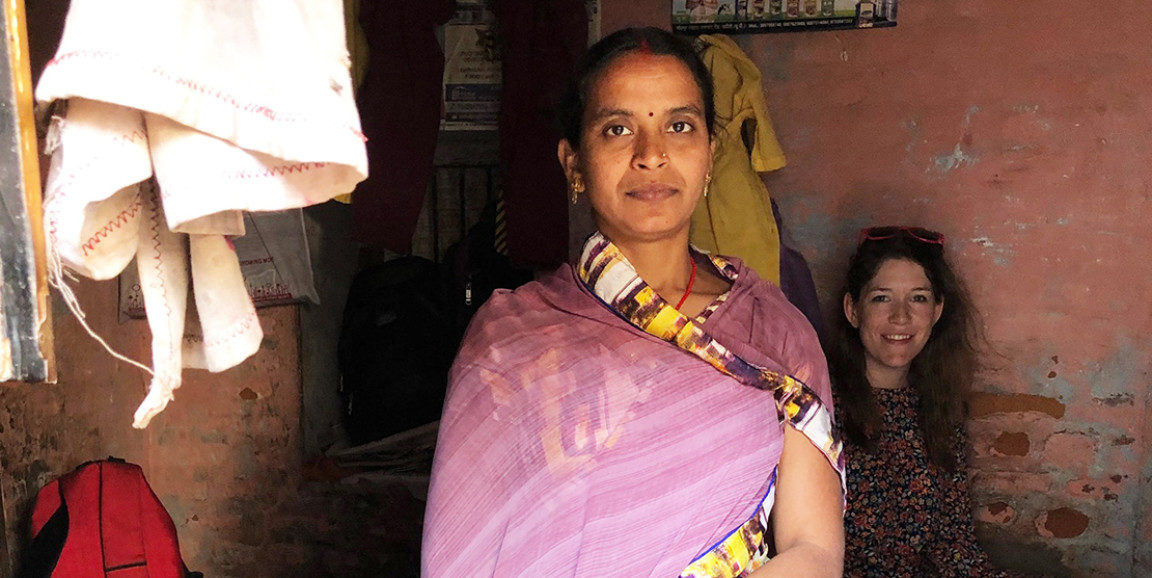“I heard a crash and went outside to see that my neighbor had fallen off his roof. His elbow was out of place, but I was able to put it back and splint it with a piece of cardboard.” - Nisha
Nisha, aged 38, is considered past childbearing years in her village of Balia, India. For that reason alone, she would typically be marginalized and considered a burden in her patriarchal community. But last year, Nisha redefined her perceived worth when she became a basic health care provider and learned how to take care of other villagers and neighbors.
Training community members as health educators isn't a new concept in India. But teaching someone with a sixth-grade education — a woman in rural India no less — to become a health care provider is unusual.
Nisha completed her initial training on a new, app-based curriculum developed half a world away at Stanford. From animated modules on a tablet, she learned to take care of common emergencies, distinguish life-threatening conditions, and most importantly, decide when to transfer patients to the hospital for care.
Four local facilitators in India utilized the curriculum app to train women from 54 villages in the states of Uttar Pradesh and Bihar. All the women, including Nisha, successfully passed a written exam and simulated patient scenarios. Most are the first trained medical providers in their villages.
The app-based curriculum already has a track record of success in Haiti, where it was first developed. In 2010, Ayesha Khan, MD, a clinical assistant professor with Stanford’s Department of Emergency Medicine, traveled there to provide relief and medical care following the 7.0 magnitude earthquake that rocked Port au Prince. Khan said she worked with local institutions to identify viable candidates to train as caregivers. Many of those recruited had grown up as orphans, and were, like their Indian counterparts, marginalized.
Khan developed the app-based curriculum to train providers remotely, using an artist to create 42 image-based modules describing care for common complaints. She created a second app with prompts and safety checks to create pathways of care, and enable local providers to run quality checks. In some instances, Khan can review flagged patients from half a world away in California.
The initial project, completed in 2012, trained health care providers for a community of 28,000.
When I recently met with Khan and asked her why she started this program, she was quick to say, “There isn’t an I. I didn’t start this. It was a group effort.” And yet, the program stems from her efforts, and the origin comes from inspiration she received from her family and the story of her grandfather.
Her grandfather, Abdul Rahman, grew up in the Pakistani village of Kakapan as the son of a farmer. Realizing the likelihood of inheriting his father’s farm was slim to none, he began to run each morning to the next village, miles away, to attend school. His running eventually earned him an athletic scholarship to a prestigious boys’ school in pre-partition India. He became the All-India Champion and made the Indian Olympic track team.
Unfortunately, several years later, after he married and became a father, he was struck by a truck while riding his bike. He lay by the side of the road until a passerby brought him to a hospital. There were no basic emergency services in the region at the time, no emergency department, and no method for triaging. He was left in the waiting area for an hour. And that is where he died.
It is a story that has inspired Khan to enter emergency medicine, and it inspired the app-based project that now empowers marginalized populations on two different continents.
In India, Nisha and other women have finished the first 14 of 42 modules, and have begun providing care. When they first started training, they arrived with heads down, unsure, Khan said. Now they are trusted agents of health, sought out by other villagers. And Khan estimates another 3,500 women are ready to start training, once funding is identified.
For more information about the program, contact Khan at akhanx@stanford.edu.
Photo of Indian health care provider by Ayesha Khan




